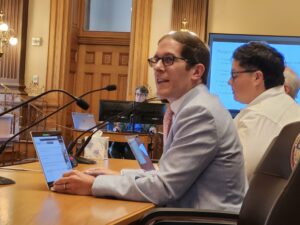Gov. Jared Polis’ pitch to convert Pinnacol Assurance into an independent company is being driven not just by money it could generate for the state budget but by the belief that failing to loosen the company’s operational restrictions could jeopardize its sustainability.
The Democratic governor sat for an interrogation before the powerful Joint Budget Committee on Wednesday about his plans to address a nearly $1 billion budget shortfall, including $638 million in expense cuts and revenue additions he has proposed. Among the most prominent and controversial of those suggestions is a proposal to allow the state-chartered workers’ compensation insurer of last resort to act as a private company, which could add $100 million to next year’s budget and more in future years.
Legislators created what is now Pinnacol in 1915 and exempted it from state and federal taxes that other insurers pay in order that it would offer workers’ comp policies to every Colorado company, even those deemed too high-risk by private insurers. However, its current structure limits Pinnacol’s to selling policies only in Colorado and selling only workers’ comp plans, and those two restrictions now are costing the company business.
With the explosion of remote work since the pandemic, Pinnacol has been unable to insure any employees of Colorado companies who live outside the state, causing many multistate employers to move their business to firms that can cover all their workers. Mark Ferrandino, director of the governor’s Office of State Planning and Budgeting, told the JBC that Pinnacol “has been losing market share and probably will continue … That is not a sustainable path.”
How Pinnacol conversion would work
Colorado would charge Pinnacol a fee to convert to a privately functioning company — an amount that officials are still working to determine but that probably would land in the range of $300 million to $500 million. That one-time infusion would go directly into the Public Employees Retirement Association pension fund to help it reach actuarial solvency, and legislators could reduce their annually required $225 million transfer to PERA by $80 million to $100 million a year for five years to help balance the budget.

Gov. Jared Polis (right) confers with Mark Ferrandino, director of the governor’s Office of State Planning and Budgeting, during a break in the JBC hearing on Wednesday.
But in an interview with The Sum & Substance, Ferrandino confirmed what he and Polis seemed to testify to the JBC — that even if the state was not looking to plug a budget hole, it likely would still push for Pinnacol conversion. It’s a policy that “the governor believes is correct” and is necessary to ensure the proper functioning of the workers’ compensation insurance system, he said.
Legislators from both sides of the aisle — Democratic Rep. Emily Sirota of Denver and Republican Sen.-elect Lisa Frizzel of Castle Rock — asked during the Wednesday hearing what would become of the insurer-of-last-resort program under this proposal. Ferrandino listed several options — including continuing to contract with Pinnacol in that function, contracting with a different insurer to fulfill that duty or setting up a reinsurance risk pool — but said that the state will continue with that role in some fashion.
“No longer able to be that provider of last resort”
Polis added that he fears Pinnacol’s continuing loss of market share without a lifting of operational restrictions could mean the firm may not be financially stable enough to offer all its existing services — including the last-resort function. And that, he told skeptical legislators, is why they need to consider this idea very seriously.
“At a high level … they will no longer be able to be that provider of last resort in the near future because of changes in the marketplace, because of changes in interstate workforce where they no longer can write policies,” the governor said. “So, my attitude is to bring them to the table now.”
Previous Pinnacol leadership teams raised the possibility of privatization twice before in the past 12 years. Legislative and policyholder opposition killed the idea in 2012 after the company invested heavily in the plan before telling businesses it was considering the path, and a bill from Republican Rep. Matt Soper died in 2021 when Democratic House leaders deemed the risks to be greater than the rewards.
Skepticism remains from key interest groups
Unions and workers’ advocates have led much of the opposition in the past, saying that allowing Pinnacol to move into a profit-first, expansionist model would take away from its commitment to offer services and benefits to injured workers. While those constituencies are seeking to learn more about this new proposal, they also are urging state leaders to be cautious about protecting injured workers in whatever deal they seek.
“While the WCEA cannot comment on the specifics, since none have been provided, we can say that for decades proposals like this have been repeatedly rejected by the Legislature because of serious concerns that it would lead to compensation being slashed for injured workers and big rate increases for businesses,” said Stephanie Tucker, president of the Workers’ Compensation Education Association. “This is a massive disruption to Colorado’s workers’ compensation system and will have far-reaching consequences to workers and business owners.”

Mark Ferrandino, director of the Office of State Planning and Budgeting, speaks in August to the Commission on Property Tax.
Ferrandino, in an interview, said that the changing marketplace, specifically the multistate nature of more employers, is the biggest difference in considering this proposal versus consideration of previous plans. Without allowing the company to adjust its business practices for a shift that’s not likely to reverse, its ability to continue offering current services could be jeopardized within three to five years, he said.
“The path Pinnacol is on is not going to allow them to continue at that level of service without increased risk if we do nothing,” said Ferrandino, a former Colorado House speaker. “It was easy to kill (previous proposals) because Pinnacol was really strong from a financial perspective and it’s always easier to keep the status quo. The status quo isn’t an option now.”
How Pinnacol leaders are approaching the talks
Pinnacol leaders, of course, must agree to any deal proposed by Polis as well, and they have put forward a set of priorities to guide them in the coming talks. Any deal must minimize impacts on policy premiums, eliminate existing barriers to coverage (like the out-of-state sales ban), leave the company with adequate reserves to cover worker claims and remove barriers to injured workers getting the care they need.
Those priorities also spell out that Pinnacol would like to remain the provider of last resort for Colorado — a role that company leaders say they have served well in, based on the high marks for their performance that they’ve gotten from both employers and injured workers.
“Yet, most Colorado employers and their workers do not have practical access to Pinnacol today. If we cannot adapt to modern workforce trends, we’ll be unable to serve a significant and still growing portion of Colorado’s workers and employers,” said Wes Parham, Pinnacol vice president of public affairs, in a statement. “As trends continue, this will also impact our long-term capacity to meet the needs of all Pinnacol customers —including those who rely on us the most. We do not take our responsibilities lightly and will continue to prioritize Pinnacol’s capital adequacy, long-term solvency, price stability and ability to adapt to meet the needs of those we serve.”
Legislative obstacles

Colorado state Sen. Jeff Bridges speaks in the Senate during the recent special legislative session.
Still, convincing legislators to convert the company and to include this proposal in the budget plan for the fiscal year that begins in July isn’t going to be simple.
Sirota said privatization of the state-chartered insurer, whose board now must be legislatively approved, could jeopardize some of the state’s most vulnerable populations working in high-risk industries without certainty of future workers’ comp plan availability. Sen. Jeff Bridges, the Greenwood Village Democrat who chairs the JBC, said he will look hard at other options to balance the budget.
“I just learned about the Pinnacol proposal when the budget came,” Bridges told Polis on Wednesday, referring to his Nov. 1 rollout of his budget plan. “I’m keeping an open mind, but I have some pretty serious concerns about that.”
One thing that Polis may have in his favor, however, is a lack of alternatives that legislators may see as palatable for addressing the $100 million hole in next year’s budget that removal of the Pinnacol conversion plan would create.
Options are limited to find $100 million
The shortfall comes from multiple factors, but lead among them are an exploding Medicaid budget as the acuity of patients in the public insurance program increases and a reduction in inflation that lowers the Taxpayer’s Bill of Rights revenue cap for the state. Polis’ other budget-balancing suggestions include keeping Medicaid provider rates flat and rewriting the school-funding formula to distribute money based on the number of students enrolled in the current year rather than a four-year enrollment average — a move that will hurt schools in areas like Denver with falling enrollment.
Bridges asked Polis what ideas he considered but didn’t propose. Polis replied that he also looked at cutting the higher-education budget by 40% to 50% and reducing Medicaid reimbursement rates by 1% to 1.5% — a move that could hammer rural hospitals already teetering on the brink of closure because of the disproportionate number of publicly insured and uninsured patients they serve — before settling on his current plan.

Colorado state Sen. Barbara Kirkmeyer, seated next to state Rep. Rick Taggart, questions Gov. Jared Polis during Wednesday’s Joint Budget Committee hearing.
Republicans on the JBC particularly hammered Polis for his overall budget proposal, with Sen. Barbara Kirkmeyer of Weld County saying she is “finding it difficult to take this budget request seriously.” She asked why Polis did not consider moves like a hiring freeze or 10% across-the-board cuts to department budgets and why he still is asking for expenditures like $5 million to celebrate the state’s 150th anniversary in 2026.
“Pinnacol … is not sustainable long-term”
Polis replied that he is happy to discuss smaller expenditures like the anniversary spending but that there are very few pots of money available in the budget other than those he listed where legislators could find $100 million or more. He also responded to concerns that the state continues to add programs and personnel without cutting other programs by saying that he is willing to nix some state services but would need legislators to direct such cuts in bills; otherwise, he would be ignoring the direction from the Legislature.
So, while legislators and workers’ groups may have apprehension about converting Pinnacol to an independent company, balancing the roughly $14 billion general-fund budget without such a proposal could be difficult. And even if the budget can be balanced without that conversion, Polis and his budget director say the idea needs to be considered for the sake of Pinnacol’s future.
“Pinnacol under its current structure is not sustainable long-term,” Ferrandino told The Sum & Substance. “As we looked at that and at the budget situation, we felt the stars were aligned to have this conversation.”
